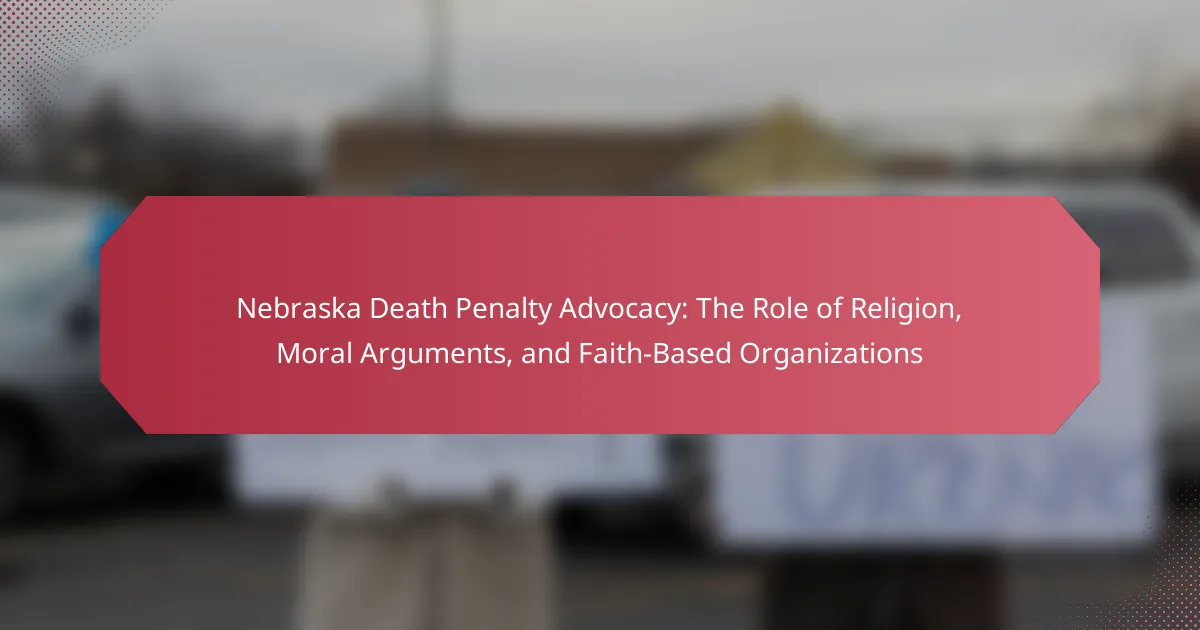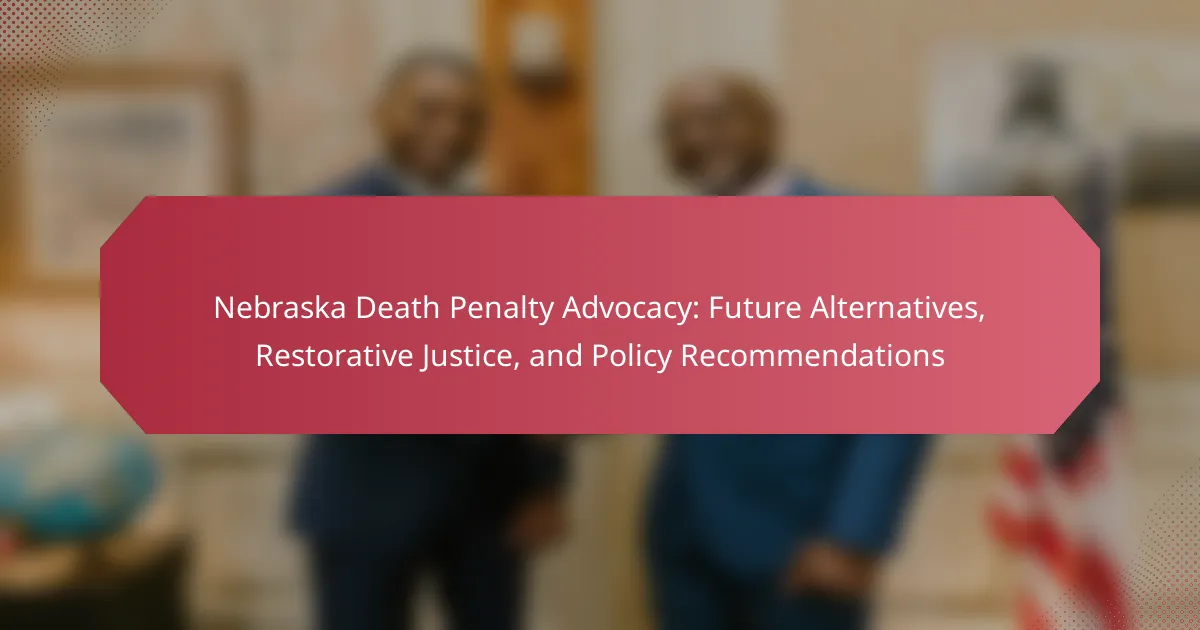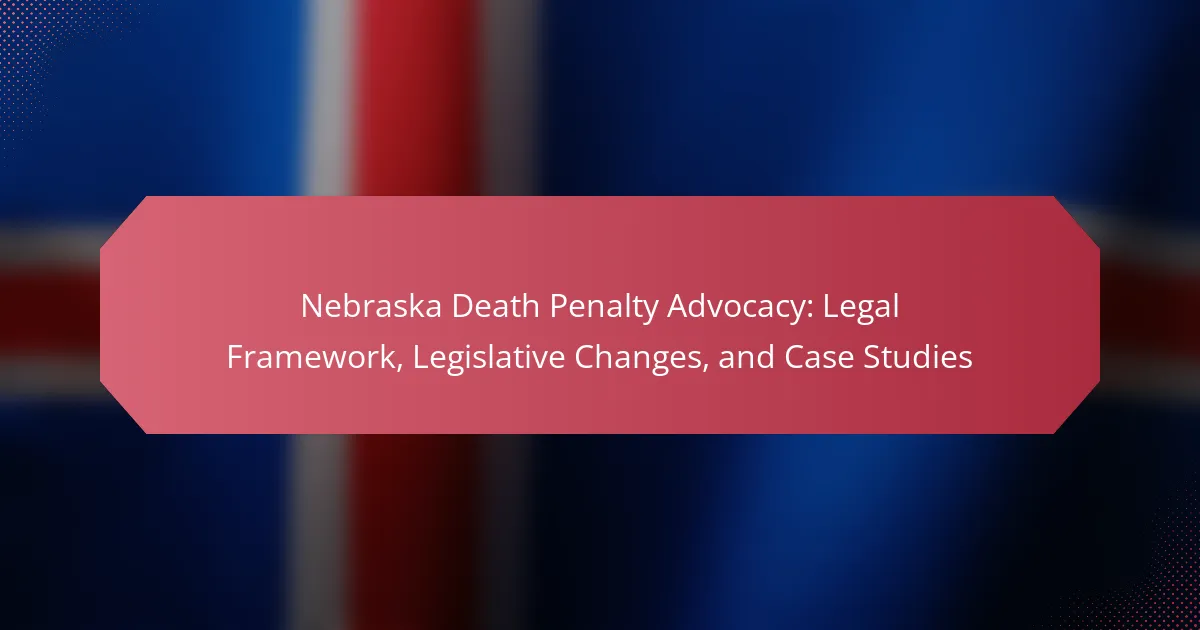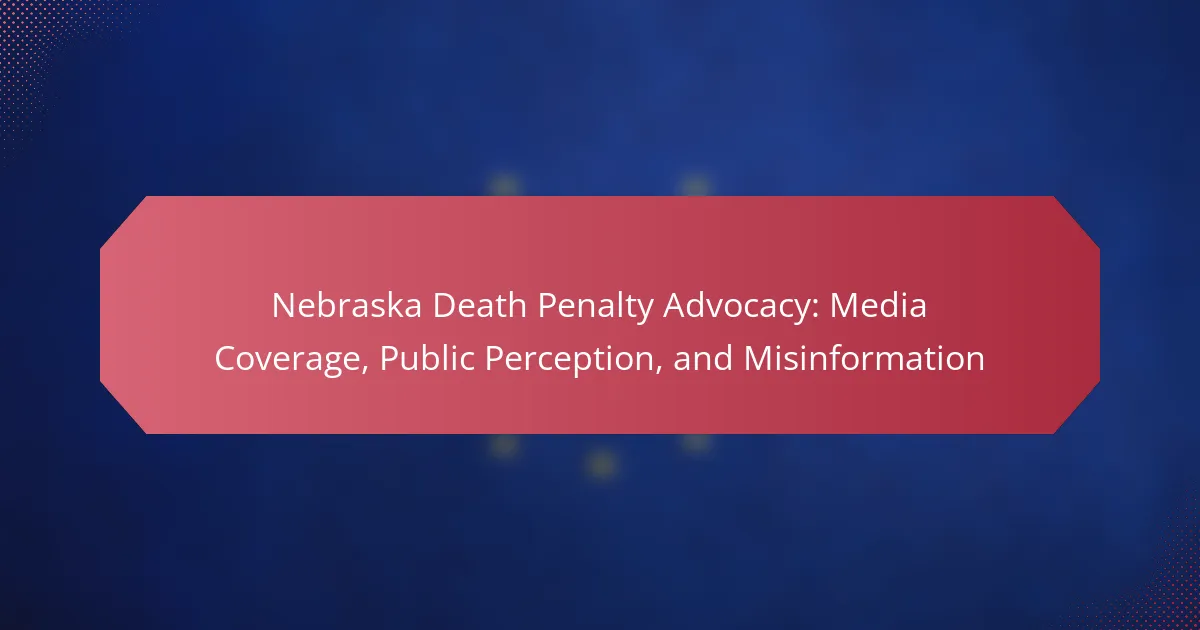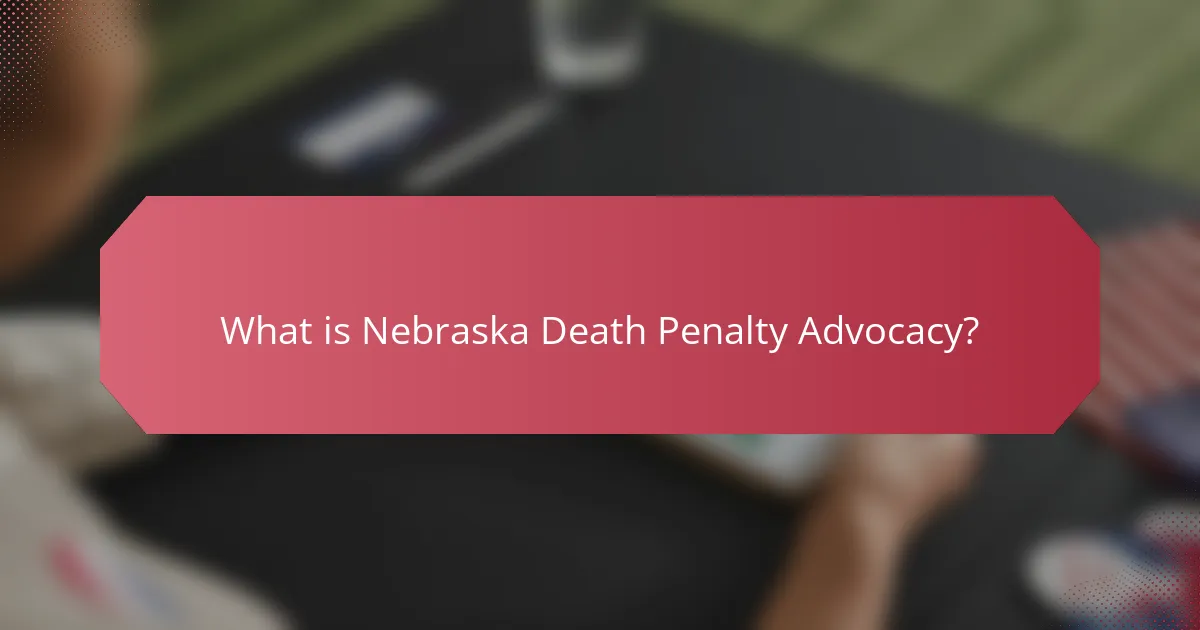
What is Nebraska Death Penalty Advocacy?
Nebraska Death Penalty Advocacy refers to efforts aimed at promoting or maintaining the death penalty in Nebraska. This advocacy includes various stakeholders, such as lawmakers, organizations, and individuals who support capital punishment. Proponents argue that the death penalty serves as a deterrent to violent crime and provides justice for victims. Historical context shows that Nebraska has had fluctuating policies regarding the death penalty. In 2015, the Nebraska legislature voted to abolish it, but the decision was overturned by a voter referendum in 2016. Advocacy efforts often involve religious groups and moral arguments that frame the death penalty as a matter of justice and societal safety.
How does religion influence Nebraska Death Penalty Advocacy?
Religion significantly influences Nebraska death penalty advocacy by shaping moral perspectives on capital punishment. Many religious groups advocate for the abolition of the death penalty, arguing it contradicts the sanctity of life. For instance, the Catholic [censured] opposes capital punishment, promoting forgiveness and redemption. This stance aligns with broader ethical views held by various faith-based organizations in Nebraska. Additionally, religious leaders often mobilize congregations to engage in advocacy efforts, creating a community dialogue around the issue. Research shows that faith communities can sway public opinion on the death penalty, emphasizing mercy and compassion. In Nebraska, the influence of religious advocacy has been evident in legislative discussions and public campaigns regarding the death penalty.
What religious beliefs support or oppose the death penalty?
Various religious beliefs both support and oppose the death penalty. Supporters often cite interpretations of scripture that advocate for justice and retribution. For instance, some branches of [censured] reference Romans 13:4, which discusses the authority of the state to wield the sword. Similarly, certain interpretations of Islamic law endorse capital punishment for specific crimes, emphasizing justice as a divine mandate.
Conversely, many religious groups oppose the death penalty on moral grounds. The Catholic [censured], for example, teaches the sanctity of life and advocates for rehabilitation over retribution. In 2018, Pope Francis declared the death penalty inadmissible in all cases. Additionally, many Protestant denominations emphasize forgiveness and redemption, arguing that capital punishment contradicts these principles.
Judaism presents a nuanced view, where some interpretations support capital punishment under strict conditions, while others prioritize mercy and the value of life. Overall, religious beliefs surrounding the death penalty vary widely, reflecting diverse theological interpretations and ethical considerations.
How do faith leaders engage in the death penalty debate?
Faith leaders engage in the death penalty debate by advocating for moral and ethical considerations. They often emphasize the sanctity of life, arguing against capital punishment. Many faith leaders participate in public discussions and forums to express their viewpoints. They may collaborate with organizations that oppose the death penalty. Research shows that religious groups influence public opinion on this issue. For instance, a survey by the Pew Research Center indicates that religious beliefs significantly impact views on capital punishment. Faith leaders also provide support to families affected by the death penalty, promoting healing and reconciliation. Their involvement often includes lobbying for legislative changes to abolish or reform capital punishment laws.
What moral arguments are presented in Nebraska Death Penalty Advocacy?
Nebraska Death Penalty Advocacy presents several moral arguments against capital punishment. Advocates argue that it violates the sanctity of life. They emphasize that taking a life is morally wrong, regardless of the crime. The argument asserts that forgiveness and redemption should be prioritized over retribution. Additionally, there is a claim that the death penalty disproportionately affects marginalized groups. This raises concerns about fairness and justice in its application. Advocates also highlight the potential for wrongful executions, which is an irreversible moral failure. Furthermore, they argue that life imprisonment without parole is a more humane and just alternative. These points collectively challenge the moral legitimacy of the death penalty in Nebraska.
What ethical frameworks are used to argue for or against the death penalty?
Utilitarianism and deontological ethics are two primary ethical frameworks used to argue for or against the death penalty. Utilitarianism focuses on the consequences of actions. Proponents argue that the death penalty deters crime and thus serves the greater good. They cite studies indicating that states with the death penalty have lower murder rates. Conversely, opponents argue that it does not effectively deter crime and can lead to wrongful executions. Deontological ethics emphasizes moral duties and rights. Supporters contend that the death penalty upholds justice for heinous crimes. Opponents argue it violates the right to life and is inherently immoral. These frameworks shape the ongoing debate surrounding the death penalty.
How do proponents justify the death penalty from a moral standpoint?
Proponents justify the death penalty from a moral standpoint by arguing it serves as a form of justice. They believe it upholds the moral order by ensuring that severe crimes receive appropriate punishment. Many proponents assert that it acts as a deterrent against future crimes. They argue that the threat of execution may prevent potential offenders from committing heinous acts. Additionally, some proponents claim it provides closure to victims’ families. They believe that executing the perpetrator can help the grieving process for those affected by violent crimes. Religious perspectives also play a role, with some citing biblical principles that support capital punishment. They argue that certain scriptures advocate for the death penalty as a means of maintaining societal order.
What role do faith-based organizations play in Nebraska Death Penalty Advocacy?
Faith-based organizations play a significant role in Nebraska death penalty advocacy. They often advocate for the abolition of the death penalty based on moral and ethical beliefs. Many religious groups emphasize the sanctity of life and promote forgiveness over retribution. They mobilize their congregations to engage in activism, including petitions and public demonstrations. These organizations frequently collaborate with other advocacy groups to amplify their message. They also provide support for families affected by capital punishment. Faith leaders often participate in public discourse, influencing lawmakers and public opinion. Their efforts contribute to shaping the moral framework surrounding the death penalty in Nebraska.
Which faith-based organizations are actively involved in the advocacy?
The faith-based organizations actively involved in advocacy against the death penalty in Nebraska include the Nebraska Catholic Conference and the United Methodist [censured]. The Nebraska Catholic Conference emphasizes the sanctity of life and advocates for alternatives to capital punishment. The United Methodist [censured] supports restorative justice principles and opposes the death penalty as incompatible with Christian teachings. Both organizations participate in campaigns, provide resources, and mobilize congregations to engage in advocacy efforts. Their involvement reflects a broader commitment to social justice and moral arguments against capital punishment.
How do these organizations mobilize their communities around the issue?
These organizations mobilize their communities through grassroots campaigns and educational initiatives. They organize events that raise awareness about the death penalty’s moral implications. Community forums and discussions are held to engage local residents in dialogue. They often collaborate with local churches and faith groups to reach a wider audience. Social media platforms are utilized to spread their message and gather support. Campaigns may include petitions to demonstrate public opposition to the death penalty. These efforts are often backed by statistical data showing public sentiment against capital punishment. By fostering community involvement, they create a collective voice advocating for change.
How does public opinion shape Nebraska Death Penalty Advocacy?
Public opinion significantly influences Nebraska Death Penalty Advocacy. Support for or opposition to the death penalty can sway legislative actions. Polls indicate fluctuating public sentiment regarding capital punishment. For example, a 2016 survey showed that 61% of Nebraskans supported the death penalty. Advocacy groups often leverage this public sentiment to push for legislative changes. When public opinion favors abolition, lawmakers may reconsider existing laws. Conversely, strong support for the death penalty can lead to its reinforcement. Public opinion thus acts as a barometer for advocacy efforts in Nebraska.
What surveys or studies reflect the views of religious communities on the death penalty?
Surveys and studies that reflect the views of religious communities on the death penalty include the Pew Research Center’s 2011 study. This study found that 49% of white evangelical Protestants support the death penalty. In contrast, only 27% of black Protestants favor it. The 2018 study by the American Academy of Arts and Sciences also provides insights. It highlights that 61% of Catholics oppose the death penalty. These findings illustrate the diverse perspectives within religious groups regarding capital punishment.
How do changing societal values impact advocacy efforts?
Changing societal values significantly influence advocacy efforts. As public opinion shifts, advocacy groups must adapt their strategies. For example, increased concern for human rights can lead to a decline in support for the death penalty. According to a 2020 Pew Research Center study, 60% of Americans now oppose the death penalty. This change prompts advocates to focus on moral arguments and religious perspectives. Faith-based organizations often play a crucial role in reshaping these narratives. Their involvement can mobilize communities and influence policymakers. Thus, advocacy efforts must remain responsive to evolving societal values to be effective.
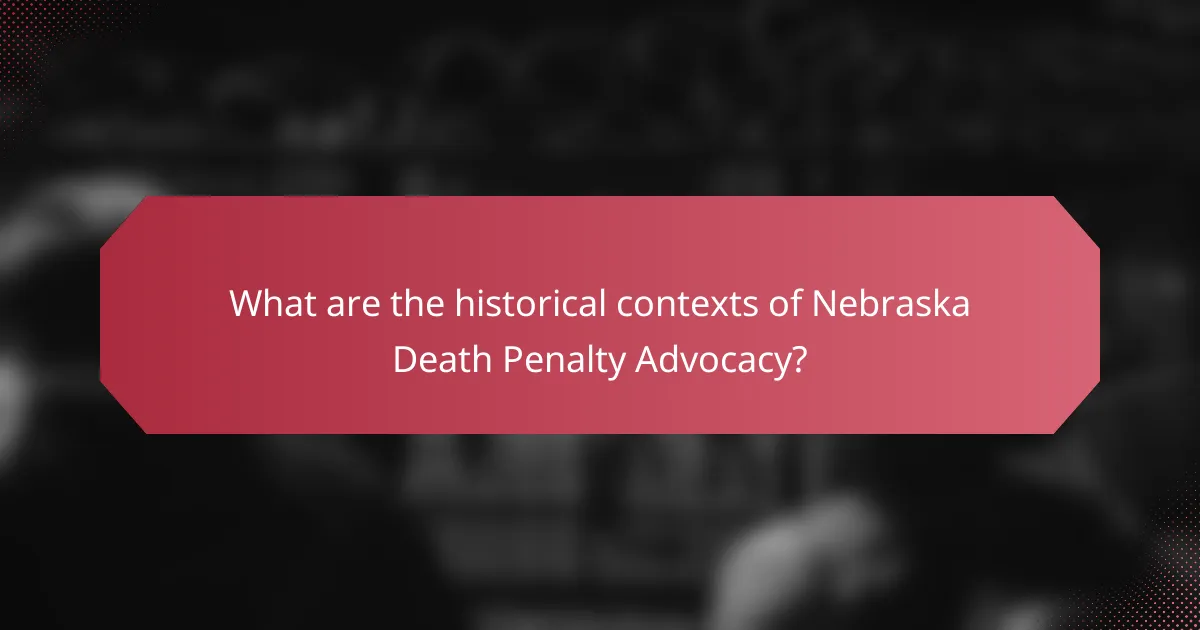
What are the historical contexts of Nebraska Death Penalty Advocacy?
Nebraska Death Penalty Advocacy has evolved significantly over time. Initially, the death penalty was widely accepted as a legal punishment in the state. In 1972, the U.S. Supreme Court’s decision in Furman v. Georgia led to a temporary halt of capital punishment nationwide, affecting Nebraska as well.
In 1979, Nebraska reinstated the death penalty with a new law. Advocacy for and against the death penalty intensified in the 1990s. Organizations such as the Nebraska Coalition to Abolish the Death Penalty emerged, promoting moral arguments against capital punishment.
In 2015, the Nebraska legislature voted to abolish the death penalty, reflecting changing public sentiment. However, Governor Pete Ricketts vetoed the bill, leading to a statewide referendum in 2016. Voters ultimately decided to retain the death penalty, illustrating the ongoing debate.
Religious groups have played a significant role in shaping these discussions, with many advocating for abolition based on moral grounds. The historical context of Nebraska’s death penalty advocacy is marked by legal changes, public opinion shifts, and the influence of faith-based organizations.
How has the death penalty evolved in Nebraska over time?
The death penalty in Nebraska has undergone significant changes since its inception. Initially, Nebraska adopted the death penalty in 1873. Over the years, the state has seen various methods of execution, including hanging and electrocution. In 1972, the U.S. Supreme Court’s decision in Furman v. Georgia led to a temporary halt of the death penalty nationwide, impacting Nebraska as well. The state reinstated the death penalty in 1979, introducing lethal injection as the primary method. In 2015, Nebraska’s legislature voted to abolish the death penalty, but this was later overturned by a referendum in 2016, reinstating capital punishment. Recent years have seen ongoing debates about the morality and effectiveness of the death penalty influenced by religious and moral arguments from various advocacy groups.
What key legal cases have influenced the death penalty’s status in Nebraska?
The key legal cases that have influenced the death penalty’s status in Nebraska include State v. Mata and State v. Moore. In State v. Mata (2016), the Nebraska Supreme Court upheld the constitutionality of the death penalty after a challenge based on the state’s lethal injection protocol. This case reinforced the legal framework for capital punishment in the state. In State v. Moore (2008), the court ruled on the application of the death penalty in cases involving mental health, which impacted how such cases are prosecuted. These rulings have shaped the ongoing legal landscape surrounding the death penalty in Nebraska.
How have historical events shaped public perception of the death penalty?
Historical events have significantly influenced public perception of the death penalty. Key events, such as high-profile executions and wrongful convictions, have sparked public debate. The abolition movement gained momentum after cases like that of Gary Gilmore in the 1970s. This case highlighted issues of morality and justice. Additionally, the 2000s saw increased awareness of wrongful convictions through DNA evidence. Such revelations shifted public opinion towards skepticism about the death penalty’s infallibility. Furthermore, international trends towards abolition have pressured U.S. states to reconsider their stance. Historical events continue to shape the evolving dialogue around capital punishment.
What legislative efforts have been made regarding the death penalty in Nebraska?
In Nebraska, significant legislative efforts regarding the death penalty have occurred over the past decade. In 2015, the Nebraska Legislature passed LB 268, which abolished the death penalty. This decision was made with a vote of 32-15, reflecting a strong bipartisan majority. However, in 2016, voters reinstated the death penalty through a ballot initiative, known as Initiative 426, with approximately 61% of the vote. Subsequent legislative attempts to repeal the death penalty have been introduced, but none have successfully passed since the reinstatement. The ongoing debates highlight the contentious nature of the death penalty in Nebraska’s legislative landscape.
What recent bills or measures have been proposed or passed?
Recent bills related to the death penalty in Nebraska include Legislative Bill 44 and Legislative Bill 726. Legislative Bill 44 aimed to abolish the death penalty entirely. It was introduced in January 2023 and discussed during the legislative session. Legislative Bill 726 proposed changes to the administration of the death penalty, focusing on execution methods. This bill was also introduced in early 2023 and has been under review. Both measures reflect ongoing debates about capital punishment in the state.
How do faith-based organizations lobby for or against these legislative efforts?
Faith-based organizations lobby for or against legislative efforts by mobilizing their communities and leveraging moral arguments. They often engage in grassroots campaigns to raise awareness and influence public opinion. These organizations may organize rallies, distribute literature, and utilize social media to advocate for their positions. Additionally, they often collaborate with other advocacy groups to amplify their message. Many faith-based organizations also engage directly with lawmakers through meetings and testimony. They provide research and data to support their stance, often framing their arguments around ethical and moral considerations. For instance, in Nebraska, groups like the Nebraska Catholic Conference have actively opposed the death penalty, citing moral teachings against capital punishment. Their efforts reflect a combination of community engagement and strategic lobbying aimed at influencing legislative outcomes.
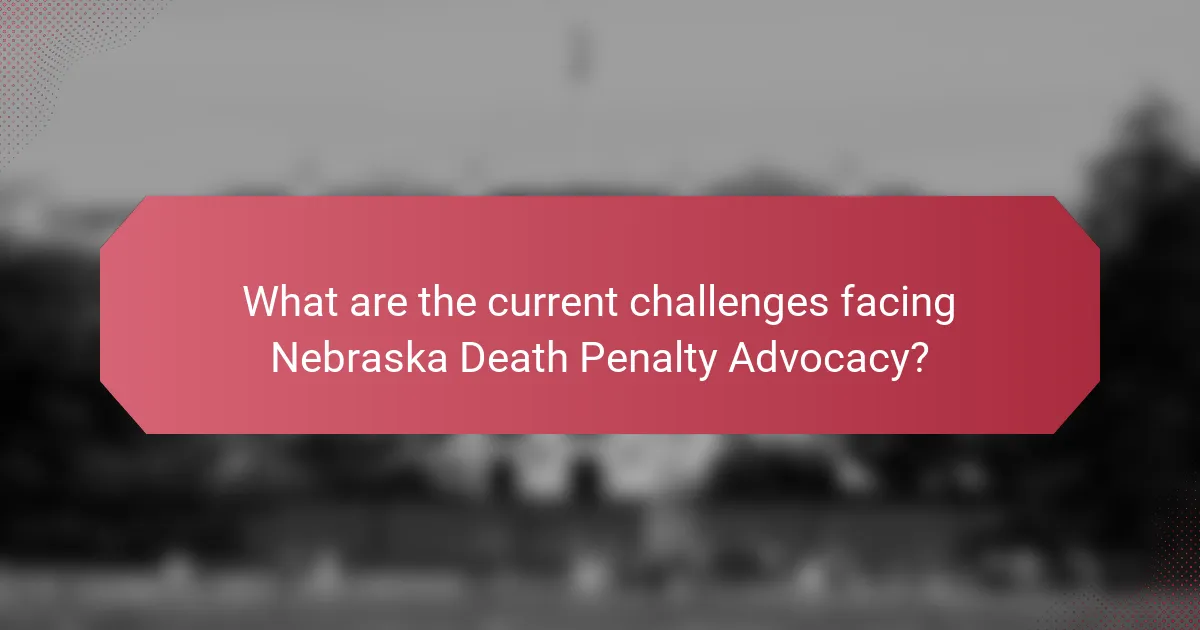
What are the current challenges facing Nebraska Death Penalty Advocacy?
Current challenges facing Nebraska Death Penalty Advocacy include shifting public opinion against capital punishment. Many Nebraskans now view the death penalty as inhumane and ineffective. Legislative efforts to abolish the death penalty have gained momentum. Advocacy groups face opposition from those who support retribution and deterrence arguments. Legal hurdles also complicate the implementation of the death penalty. Issues surrounding drug availability for executions have led to delays. Additionally, moral arguments from faith-based organizations challenge its ethical justification. These factors collectively hinder the progress of death penalty advocacy in Nebraska.
What opposition do advocates face from anti-death penalty groups?
Advocates for the death penalty face significant opposition from anti-death penalty groups. These groups argue that capital punishment is inhumane and violates human rights. They emphasize the possibility of wrongful convictions, highlighting cases where innocent individuals were sentenced to death. Anti-death penalty advocates also cite studies showing no deterrent effect on crime rates. They argue that the death penalty disproportionately affects marginalized communities. Additionally, these groups promote alternatives to capital punishment, such as life imprisonment without parole. Their efforts often include lobbying for legislative changes and raising public awareness.
How do these groups articulate their stance against the death penalty?
These groups articulate their stance against the death penalty through moral and religious arguments. They emphasize the sanctity of life as a core belief. Many organizations cite religious texts that advocate for forgiveness and redemption. They argue that the death penalty is a form of state-sanctioned violence. Statistics show that it does not deter crime effectively. Additionally, they highlight the risk of executing innocent individuals. Groups often engage in public campaigns and educational efforts to raise awareness. They seek to influence legislation by lobbying policymakers against capital punishment.
What strategies do they use to counter faith-based arguments?
They use logical reasoning and empirical evidence to counter faith-based arguments. Advocates present statistics on the ineffectiveness of the death penalty in deterring crime. They highlight studies showing the disproportionate impact on marginalized communities. Additionally, they emphasize moral arguments against the death penalty that align with various religious teachings. These strategies aim to bridge the gap between faith and rational discourse. By focusing on shared values, they seek to engage religious audiences effectively.
What are the implications of Nebraska Death Penalty Advocacy for future policies?
Nebraska Death Penalty Advocacy may lead to significant changes in future policies regarding capital punishment. The advocacy highlights moral arguments that challenge the ethical justification of the death penalty. This could result in legislative efforts to abolish or reform capital punishment in Nebraska. Furthermore, faith-based organizations involved in the advocacy may influence public opinion and lawmakers. Their involvement can shift the discourse towards rehabilitation rather than retribution. Historical data shows that states with strong advocacy movements have reconsidered their death penalty laws. For instance, Nebraska itself previously abolished the death penalty in 2015, only to reinstate it later. Such fluctuations indicate that ongoing advocacy can create a dynamic policy environment.
How might changes in advocacy impact the legal landscape of the death penalty?
Changes in advocacy can significantly impact the legal landscape of the death penalty. Advocacy efforts can lead to shifts in public opinion. Increased public opposition may prompt lawmakers to reconsider existing laws. For example, states like Nebraska have seen legislative attempts to abolish the death penalty influenced by advocacy groups. These groups often use moral and religious arguments to sway public sentiment. When advocacy gains momentum, it can result in ballot initiatives or legislative proposals. Historical examples show that states with strong advocacy movements have successfully repealed capital punishment. This trend indicates that advocacy plays a crucial role in shaping legal outcomes regarding the death penalty.
What role will religion continue to play in shaping these policies?
Religion will continue to play a significant role in shaping death penalty policies in Nebraska. Faith-based organizations often advocate for the abolition of the death penalty based on moral grounds. Many religious teachings emphasize forgiveness and the sanctity of life. This perspective influences public opinion and legislative decisions. Historical examples show that religious groups have actively campaigned against capital punishment. Their efforts can lead to shifts in policy and law. In Nebraska, religious leaders have publicly voiced opposition to the death penalty, impacting lawmakers. The ongoing dialogue between religion and policy will likely persist as societal values evolve.
What practical steps can individuals take to engage in Nebraska Death Penalty Advocacy?
Individuals can engage in Nebraska Death Penalty Advocacy by educating themselves on the issue. Understanding the history and current status of the death penalty in Nebraska is essential. They can participate in local advocacy groups focused on death penalty reform. Joining organizations that oppose the death penalty provides resources and support. Writing to state legislators about their stance can influence policy decisions. Attending public forums and discussions raises awareness and encourages community involvement. Volunteering for campaigns against the death penalty amplifies their voice. Lastly, sharing information on social media helps spread awareness to a broader audience. Each of these steps contributes to a collective effort for change in Nebraska’s death penalty policy.
How can community members educate themselves on the issue?
Community members can educate themselves on the issue of the death penalty through various resources. They can attend local workshops and seminars focused on criminal justice and ethics. Reading books and articles written by experts in the field is also beneficial. Engaging with faith-based organizations that discuss moral arguments surrounding the death penalty can provide insights. Participating in community discussions or forums allows for the exchange of diverse perspectives. Following reputable news sources that cover death penalty cases and legislation can keep members informed. Utilizing online platforms, such as educational websites and webinars, offers accessible information. Joining advocacy groups dedicated to criminal justice reform can further enhance understanding of the issue.
What actions can individuals take to support or oppose the death penalty in Nebraska?
Individuals can support or oppose the death penalty in Nebraska through various actions. They can participate in advocacy groups that align with their stance. Engaging in public demonstrations or rallies can raise awareness. Writing letters to lawmakers can influence policy decisions. Individuals can also share information on social media to educate others. Volunteering with organizations that focus on criminal justice reform is another effective action. Attending town hall meetings allows for direct discussion with policymakers. Supporting candidates who share their views can impact legislation. Finally, participating in petitions can mobilize community support for or against the death penalty.
Nebraska Death Penalty Advocacy centers on efforts to promote or maintain capital punishment in Nebraska, involving various stakeholders, including lawmakers and religious organizations. The article explores the influence of religious beliefs on advocacy, highlighting arguments for and against the death penalty based on moral and ethical considerations. It examines the role of faith-based organizations in shaping public opinion and legislative actions, as well as the historical context and recent challenges faced in the ongoing debate surrounding the death penalty in Nebraska. Key discussions include the impact of public sentiment, the moral arguments presented by both supporters and opponents, and the strategies employed by advocacy groups to mobilize communities.
